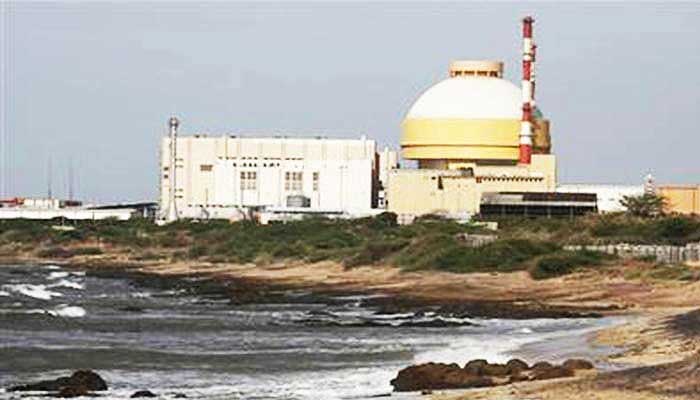Kanupp-2 to come online in Dec 2020
The share of nuclear energy in Pakistan’s generation mix stands at 6.0 percent producing power at an average cost of Rs9.13/kWh.
KARACHI: The 1,100MW Karachi Nuclear Power Complex-II (KANUPP-2) will come online in December 2020 followed by 1,100MW KANUPP-3 in October 2021, Pakistan Atomic Energy Commission Chairman Muhammad Naeem said.
“Soon after that the 100MW Chasma-5 will be completed, as the country plans to generate 8,800MW nuclear energy by 2030,” he said, speaking at a seminar titled “Energy Security Policy: Thinking Beyond the Norm” organised by the Centre for Peace, Security and Developmental Studies (CPSD) on Monday.
Naeem informed that both the plants had a workable life of 60 years, which could be extended to 80 years. “Nuclear power plants are reliable having high availability and capacity factor, relatively environment friendly, and provide sustainability of electricity price having low share of fuel cost,” he added. The share of nuclear energy in Pakistan’s generation mix stands at 6.0 percent producing power at an average cost of Rs9.13/kWh.
At the moment around 454 nuclear power plants are operating in 30 countries across the world constituting 11 percent of the world’s electricity generation, while 54 plants in 17 countries are under construction.
Alternate Energy Development Board (AEDB) Chairman Amjad Ali Awan said Pakistan still did not have any energy security policy while the economy was hostage to shortages. “Around 24 percent of Pakistan’s total imports are energy related. It is the need of the hour to phase out the imports in favour of indigenous resources.”
He said the country was blessed with renewable energy resources, including wind and solar, which should be harnessed. “Wind and solar energy have the cheapest tariff in the country, and renewables should be integrated with conventional resources to design a sustainable mix.”
Former energy minister Sohail Wajahat said for the last 70 years policies were made on ad hoc basis, which had landed the nation in such a mess. “An integrated energy policy is desperately needed for at least five years without any reversal.”
Experts from the energy sector and governmental officials deliberated on the different dimensions of the subject and they agreed unanimously that the country needed a concrete and sustainable integrated energy policy.
CPSD President Agha M Umer Farooq emphasised that commitments of the energy producer and habits of consumers needed to be changed to encourage conservation, efficiency, and a fuel mix comprising indigenous resources.
Chief Guest, CJCSC General Zubair Mahmood Hayat NI (M) appreciated efforts of CPSD for organising the seminar which provided a platform to probe core issues of the energy sector in Pakistan.
-
 Meghan Markle’s Family Shares Important News Amid Estrangement
Meghan Markle’s Family Shares Important News Amid Estrangement -
 BAFTA, BBC, And Tourette’s Advocate John Davidson Issue Formal Statements For His Onstage Slur
BAFTA, BBC, And Tourette’s Advocate John Davidson Issue Formal Statements For His Onstage Slur -
 Kanye West's Malibu Beachfront Mansion Enters Controversy Again As Ex-employee Seeks $1M In Alleged Unpaid Wages
Kanye West's Malibu Beachfront Mansion Enters Controversy Again As Ex-employee Seeks $1M In Alleged Unpaid Wages -
 Tom Hanks To Lead Experimental Biopic About Distant Relative Abraham Lincoln
Tom Hanks To Lead Experimental Biopic About Distant Relative Abraham Lincoln -
 'CIA' Starring Tom Ellis Promises Fresh Take Beyond FBI Franchise
'CIA' Starring Tom Ellis Promises Fresh Take Beyond FBI Franchise -
 Congressman Tony Gonzales Faces Resignation Calls Amid Investigation
Congressman Tony Gonzales Faces Resignation Calls Amid Investigation -
 Royal Family Not Allowed To Play THIS Fun Game: ‘It Gets Too Vicious’
Royal Family Not Allowed To Play THIS Fun Game: ‘It Gets Too Vicious’ -
 Heidi Klum Exposes Harsh Modeling Rule She Faced While Expecting
Heidi Klum Exposes Harsh Modeling Rule She Faced While Expecting -
 US Women’s Hockey Team Skips State Of The Union After Gold Medal Win
US Women’s Hockey Team Skips State Of The Union After Gold Medal Win -
 Toronto Weather Forecast: Snow Storm Advisory Lifted After Icy Conditions
Toronto Weather Forecast: Snow Storm Advisory Lifted After Icy Conditions -
 How ‘deafness’ In Andrew Scandal Has Changed Monarchy ‘forever’
How ‘deafness’ In Andrew Scandal Has Changed Monarchy ‘forever’ -
 Gisele Bundchen Drops Postpartum Workout Secret She Calls A 'game Changer'
Gisele Bundchen Drops Postpartum Workout Secret She Calls A 'game Changer' -
 1 In 5 Teens Exposed To Unwanted Sexual Content On Instagram, Report Finds
1 In 5 Teens Exposed To Unwanted Sexual Content On Instagram, Report Finds -
 US Judge Aileen Cannon Issues Permanent Order In Trump Documents Case
US Judge Aileen Cannon Issues Permanent Order In Trump Documents Case -
 King Charles, Royals Are Not ‘bright’ Enough To Live In Mansions
King Charles, Royals Are Not ‘bright’ Enough To Live In Mansions -
 'Final Throw Of The Dice': Paramount Submits Highest Bid Offer To Warner Bros. In Last Round
'Final Throw Of The Dice': Paramount Submits Highest Bid Offer To Warner Bros. In Last Round




